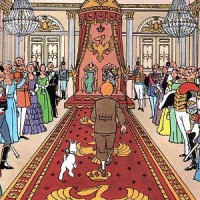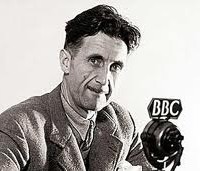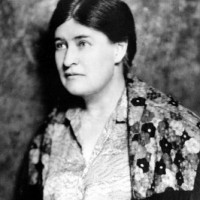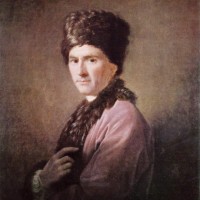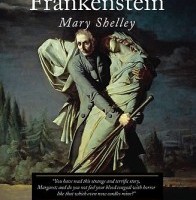Tintin: The True European, by Peter Strzelecki Rieth
As Europe struggles with economic woes brought on by the combination of unrestricted government largess and corruption and avarice, it seems every thread of this current struggle emanates from the problem of European character and the concurrent angst surrounding it. A brief reflection on the problem of European character and an illustration of how centered it is at the causal crux of the European crisis may equip us to provide some solutions.
In brief, what I call the problem of European character and the concurrent angst surrounding it is the fact that the essence of the European Union, the modern European political project, is a negation of war between European nations. This means that the European character, if one can even speak of such a thing, is founded in the proposition that whatever happens, Europeans must remain united, for division inevitably leads to a war of all against all and the annihilation of European civilization. The founding event of this outlook was World War II. As such, there is no positive defining trait of European character, only a negation of war, which is to say that modern Europe is founded on the fear of being toward death. This special kind of glue holding the Union together is, to my mind, best defined using Heidegger’s concept of angst. Thus, when crisis strikes on account of numerous errors, a fear sets in against tampering with the ailing union as that may lead to its collapse and to war. Yet to do nothing, or as some quarters are urging, to strengthen the faulty bonds of union even further, will lead also to collapse and war because it will deepen the crisis and give rise to public aggravation and revolutionary fervor. The diagnosis is clear: the European Union, which arose from the common European character trait of angst, cannot sustain itself by angst. The European character must be enriched with positive traits or be undone.
Some “Euro-enthusiasts” may well now shake their heads and claim that this expanded, positive European character already exists, made visible in the thousands of pages of regulations instructing the citizenry on how to be tolerant, open-minded humanitarians who love mother Earth, their fellow man, and embrace science. The chief problem with this view, abstracting from the philosophical questions that arise regarding the desirability of this particular modern, ahistorical, and secular European character, is that it resides in regulations, not in the heart of the people. Regulation lacks the personal import even of law. The importance of this distinction is such that regulation dictates the minutiae of everyday life. It not only prescribes an ethos, as law does, it dictates the precise, quantified application of said ethos. Civilizations which are built on virtues, whether piety or tolerance, that are mandated, registered, stamped, and stipulated in paragraph 16, subsection 2 of the revised revision of the regulations revising previous revisions–such civilizations die.
Here, angst will worry: does it therefore follow that Europeans are destined to fall back on national and ethnic prejudices? Perhaps there are other alternatives available to them besides secular, liberal sophistication masking bureaucratic banality or some pompous nationalist stereotypes. Certainly the philosophers present us with numerous alternatives, though all of them might well be impractical for any landmass not populated by a majority of philosophers. We also cannot, it appears to me, reach far back into European history, for to expect of modern Europeans to adopt Roman virtue, Athenian wisdom, let alone Christian agape, may well be expecting too much. If we wish to look for something in modern European history grounded in a firmer basis than philosophical speculation then I suggest we look no further than Tintin.
Tintin, for those who do not know and love him, is the European par excellence, created by author Hergé. His authority is widely acknowledged by children throughout the world, regardless of their age. General DeGaulle apparently called Tintin his only international rival. Tintin, if one really thinks about it, is the perfect template for a European character rooted in positive traits rather than merely in angst. Rather menacingly, the present generation risks knowing Tintin not through his European manifestation, but through the rather poor interpretation of his adventures presented to the world by the American director Steven Spielberg. All the more reason why I shall now endeavor to make a composite defense of Tintin as being of paramount importance and relevance to the present crisis.
First, Tintin has proven himself a keen political realist. I begin with this because some may well now expect me to embark on platitudes regarding Boy Scout virtues as exemplified by Tintin, rather than say anything of hard-nosed relevance to the grave situation Europe faces. Quite the contrary! It was Tintin, who, back in 1929, exposed the totalitarianism of the Soviet Union and the plight of its people at a time when the vast majority of Western opinion was either ignorant of or fascinated with the Soviet system. Tintin’s revelations were, for decades, characterized as childish caricatures until the publication of the Black Book of Communism made the broad public aware of what Tintin had reported as fact from the very outset. This, if nothing else, qualifies Tintin for serious consideration as a relevant voice in European affairs: where so many were wrong about the Soviet Union, he was right from the beginning.
Detractors will no doubt point out that Tintin may well have been stunningly right in his premiere journalism, but quickly followed up on that by being stunningly wrong in his treatment of European colonialism. From his wholesale slaughter of the helpless species populating the Congo, to his insensitive remarks to a room full of Congolese regarding their homeland “Belgium”, one quickly can see why these detractors may feel it quite a bad idea to hold Tintin up as a worthy ideal for European character. Why, at one point, Tintin even helped a Priest!
Yet the measure of ideals is not their perfection, but rather how they deal with their all too human imperfections. In the case of young Tintin in Congo, he did what he could to help the native populations, while everything we might be tempted to fault him for was, as author Hergé admitted, the result of not taking his work too seriously at the time and being unreflective about the prejudices of his age. Out of all of Tintin’s remarkable adventures, his sojourn through the Congo may be most fraught with vices, but we can take heart that Tintin learned from his mistakes, as we can see in his escapades in the Far East shortly after leaving the Congo. There, Tintin so exemplified courageous virtues in his gallant struggle to aid the Chinese in their time of desperation as to have earned the praise of Chiang Kai-Shek himself, not to mention endearing himself to the Dalai Lama, who to this day declares his love for the boy reporter.
This evolution from a rhino-hunting, crocodile-dynamiting, Al Capone-chasing adventurer into a serious young man of high moral principle and gallant instinct betrays a character trait sorely lacking in the modern European. The modern European is nihilistic in private, bureaucratic in public. Tintin, by contrast, demonstrated a a playful lightness and joi de vivre in his private life combined with moral conscience in public life. Tintin’s youth, his evolution, is not linear, but rather curvilinear. In the beginning, he fluctuates between noble deeds like helping the Indians by fighting exploitative Americans and lighthearted slap stick. Yet as Tintin’s experience of the world grows, his moral imagination is refined and his humor matures. The latter is actually tied intimately with the former, as moral reflection is quite impossible without humor. Only a character type like that of Tintin’s could permit such an evolution, and only a European of such character could hope to escape the trap of modern European Union: the prospect of despotic union or war, both laced with angst.
Tintin’s political teaching does not, however, stop there. He provides us with a wonderful illustration of the folly of radical factionalism and demonstrates how it is always the mother of despotism. How memorable his misadventures are in the banana republic of Generals Alcazar and Tapioca, where revolutions take place on a daily basis, where the people oscillate between wild revolutionary fervor and grinding tyranny, where no matter who wins, dictatorship and poverty remain constant. The illustration, although set in a South American context, certainly does tell us quite a bit about human nature and the folly of revolutions. Far from being a means towards salvation from tyranny, Tintin seems to teach us that strife, faction, and partisan division are a direct route to tyranny. Civilized people, in contrast to the banana republics, Tintin suggests, never engage in revolution but rather rely on other means. Revolutions appear an easy solution, but end up solving nothing while expending the accumulated public stock of disappointed hope.
Read the complete article in The Imaginative Conservative
George Orwell’s Despair, by Russell Kirk.
In the twentieth century, no novelist exerted a stronger influence upon political opinion, in Britain and America, than did George Orwell. Also Orwell was the most telling writer about poverty. In a strange and desperate way, Orwell was a lover of the permanent things. Yet because he could discern no source of abiding justice and love in the universe, Orwell found this life of ours not worth living. In his sardonic fashion, nevertheless, he struck some fierce blows at abnormality in politics and literature.
“There is no such thing as genuinely nonpolitical literature,” Orwell wrote in his essay on “The Prevention of Literature” (1945), “and least of all in an age like our own, when fears, hatreds, and loyalties of a directly political kind are near to the surface of everyone’s consciousness….It follows that the atmosphere of totalitarianism is deadly to any kind of prose writer, though a poet, at any rate a lyric poet, might possibly find it breathable. And in any totalitarian society that survives for more than a couple of generations, it is probable that prose literature, of the kind that has existed during the past four hundred years, must actually come to an end.” Soviet Russia supplies the proof: “It is true that literary prostitutes like Ilya Ehrenberg or Alexei Tolstoy are paid huge sums of money, but the only thing which is of any value to the writer as such—his freedom of expression—is taken away from him.”
read the complete article in The Imaginative Conservative
The Christian Humanism of Willa Cather, by Bradley J. Birzer
On Sunday, August 11, 2013, my family and I began our now-yearly odyssey into the West. As I write this, our vacation is ending, and I’m typing this from the second floor of a rented house in the Rockies, looking across my laptop out the window at Mt. Ouray.
In two days, our kids have pre-opening at their academy, back in Michigan, and the next morning I’ll attend the same for my job. I’m not quite ready to leave the glories of the American West, but, should I continue to care about a steady income and providing for my family, eastward I must return.
Some of my very first posts at The Imaginative Conservative were written three years ago on such a trek. I can no longer embark on annual trips without thinking of The Imaginative Conservative and without considering editorial mastermind Winston Elliott’s birthday (August 13), a day that will be celebrated some day in the Republic of Texas and, if it still exists, the United States of America.
A significant part of our yearly ritual and travel is my wife reading fiction to me as I drive. Dedra has one of the best reading voices I’ve ever encountered, and, as long as my children aren’t fighting with one another or with imaginary friends, I look forward to her reading almost as much as I look forward to the sites I’m about to encounter on our adventures.
Dedra can read anything and read it well, but she most often gravitates either to the mysteries of Ralph McInerny and Sharon McCrumb or to the fiction of Willa Cather. We both have adored Cather since college. With The Imaginative Conservative’s beloved John Willson, I try to read Death Comes for the Archbishop at least once year. I think a solid case could be argued for considering this novel the “Great American Novel” if such a label needs to be employed. Cather’s West is what the American West should’ve been, rather than what it was. In Cather’s vision, the West is humane, challenging, and, ultimately, in the best Ciceronian sense, cosmopolitan.
Cather’s life
Looking back a century and a half, it would probably not have been wise to have bet on the success of Cather. Born in Virginia, her parents moved her to extreme south central Nebraska (only miles from the Kansas line and only about fifteen miles from the geographic center of the 48 states). Oldest of seven children, her parents homeschooled (or its past equivalent) Willa with their neighbors, raising her around German, Polish, Bohemian, Moravian, Swedish, and Russian immigrants. American Indians arrived in Red Cloud from time to time, as did Americans of African descent. All of this immigration and community with the treeless backdrop of the Great Plains fascinated Cather. Here, as a young woman, she experienced what most sociologists only imagine in their wildest dreams. While the various peoples and peopling of the land mattered to Cather, so too did the land.
Then the Genius of the Divide, the great, free spirit which breathes across it, must have bent lower than it ever bent to a human will before. The history of every country begins in the heart of a man or a woman.
So wrote Cather of her first great heroine, Alexandra, in O Pioneers!.
Graduating from the University of Nebraska in Lincoln in 1895, Cather went east to work as a muck-racking journalist. She gained considerable attention and fame at the notorious but popular McClures and she gave herself fulltime to her fiction in 1912. Her many works include: April Twilights (1903); Alexander’s Bridge (1912); O Pioneers! (1913); The Song of the Lark (1915); My Ántonia (1918); Youth and the Bright Medusa (1920); One of Ours (1922; for which she won the Pulitizer Prize); A Lost Lady (1923); The Professor’s House (1925); My Mortal Enemy (1926); Death Comes to the Archbishop (1927); Shadows on the Rock (1931); Obscure Destinies (1932); and Lucy Gayheart (1935).
Sometime in the 1920s, Cather’s anti-progressive views became quite clear, and the left despised her. She died, horribly, in some literary obscurity, rescued only after her death.
Read the complete article in The Imaginative Conservative
The Road to Same-Sex Marriage was Paved by Rousseau, by Robert R. Reilly
At the heart of the debate over same-sex marriage are fundamental questions about who men are and how we decide what makes us flourish.
Ineluctably, the issue of “gay” rights is about far more than sexual practices. It is, as lesbian advocate Paula Ettelbrick proclaimed, about “transforming the very fabric of society … [and] radically reordering society’s views of reality”.
Since how we perceive reality is at stake in this struggle, the question inevitably rises: what is the nature of this reality? Is it good for us as human beings? Is it according to our Nature? Each side in the debate claims that what they are defending or advancing is according to Nature.
Opponents of same-sex marriage say that it is against Nature; proponents say that it is natural and that, therefore, they have a “right” to it. Yet the realities to which each side points are not just different but opposed: each negates the other. What does the word Nature really mean in this context? The words may be the same, but their meanings are directly contradictory, depending on the context. Therefore, it is vitally important to understand the broader contexts in which they are used and the larger views of reality of which they are a part since the status and meaning of Nature will be decisive in the outcome.
Let us then review briefly what the natural law understanding of “Nature” is and the kinds of distinctions an objective view of reality enables us to make in regard to our existence in general and to sexuality in particular. The point of departure must be that Nature is what is, regardless of what anyone desires or abhors. We are part of it and subject to it. It is not subject to us. Thus, we shall see how, once the objective status of Nature is lost or denied, we are incapacitated from possessing any true knowledge about ourselves and about how we are to relate to the world. This discussion may seem at times somewhat unrelated to the issues directly at hand, but it is not. It is at its heart and soul. Without it, the rest of our discussion is a mere battle of opinions.
Order in the Universe – Aristotle’s Laws of Nature
There are two basic, profoundly different anthropologies behind the competing visions of man at the heart of the dispute over same-sex marriage. For an understanding of the original notion of Nature, we will turn to those who began the use of the term in classical Greece, most especially Plato and Aristotle. To present the antithesis of this understanding, we will then turn to Jean-Jacques Rousseau, who eviscerated the word of its traditional meaning in the 18th century and gave it its modern connotation.
The older anthropology is Aristotelian, which claims that man is by Nature a political animal for whom the basic societal unit is the family. The newer is Rousseauian, which claims that man is not a political animal and that society in any form is fundamentally alien to him. These two disparate anthropologies presuppose, in turn, two radically different metaphysics: one is teleological; the other is non-teleological, or anti-teleological. Again, the first one has its roots in Aristotle, the second in Rousseau. These two schools of thought provide convenient and necessary philosophical perspectives within which to understand the uses of the words “natural” and “unnatural” as they are variously employed by the proponents and opponents of homosexual acts and same-sex marriage today.
The discovery of Nature was momentous, as it was the first product of philosophy. Man first deduced the existence of Nature by observing order in the universe. The regularity with which things happen could not be explained by random repetition. All activity seems governed by a purpose, by ends to which things are designed to move. Before this discovery, in the ancient, pre-philosophical world, man was immersed in mythological portrayals of the world, the gods, and himself. These mythopoeic accounts made no distinction between man and Nature, or between convention and Nature. A dog wagged its tail because that was the way of a dog. Egyptians painted their funeral caskets in bright colors because that was the way of the Egyptians. There was no way to differentiate between the two because the word “Nature” was not available in the vocabulary of the pre-philosophical world.
According to Henri Frankfort in Before Philosophy, it was Heraclitus who first grasped that the universe is an intelligible whole and that therefore man is able to comprehend its order. If this is true – and only if it is true – man’s inquiry into the nature of reality becomes possible. The very idea of “Nature” becomes possible. How could this be? Heraclitus said that the universe is intelligible because it is ruled by and is the product of “thought” or wisdom. If it is the product of thought, then it can be apprehended by thinking. We can know what is because it was made by logos. We can have thoughts about things that are themselves the product of thought.
As far as we know, Heraclitus and Parmenides were the first to use the word logos to name this “thought” or wisdom. Logos, of course, means “reason” or “word” in Greek. Logos is the intelligence behind the intelligible whole. It is logos which makes the world intelligible to the endeavor of philosophy, ie, reason. In the Timaeus, Plato writes, “… now the sight of day and night, and the months and the revolutions of the years, have created number, and have given us a conception of time; and the power of inquiring about the nature of the universe; and from this source, we have derived philosophy, than which no greater good ever was or will be given by the gods to mortal man.” Through reason, said Socrates, man can come to know “what is”, ie, the nature of things.
Aristotle taught that the essence or nature of a thing is what makes it what it is, and why it is not something else. This is not a tautology. As an acorn develops into an oak tree, there is no point along its trajectory of growth that it will turn into a giraffe or something other than an oak. That is because it has the nature of an oak tree. By natural law, in terms of living things, we mean the principle of development which makes it what it is and, given the proper conditions, what it will become when it fulfills itself or reaches its end. For Aristotle, “Nature ever seeks an end”. This end state is its telos, its purpose or the reason for which it is. In non-human creation this design is manifested through either instinct or physical law. Every living thing has a telos toward which it purposefully moves. In plants or animals, this involves no self-conscious volition. In man, it does.
Anything that operates contrary to this principle in a thing is unnatural to it. By unnatural, we mean something that works against what a thing would become were it to operate according to its principle of development. For instance, an acorn will grow into an oak unless its roots are poisoned by highly acidic water. One would say that the acidic water is unnatural to the oak or against its “goodness”.
The term “teleological”, when applied to the universe, implies that everything has a purpose, and the purpose inheres in the structure of things themselves. There is what Aristotle called entelechy, “having one’s end within”. The goal of the thing is intrinsic to it. These laws of Nature, then, are not an imposition of order from without by a commander-in-chief, but an expression of it from within the very essence of things, which have their own integrity. This also means that the world is comprehensible because it operates on a rational basis.
It is by their natures that we are able to know what things are. Otherwise, we would only know specificities, and be unable to recognize things in their genus and species. In other words, we would only experience this piece of wood (a tree), as opposed to that piece of wood (another tree), but we would not know the word “tree” or even the word “wood”, because we would not know the essence of either. In fact, we would know nothing.
Nature is also what enables one person to recognize another person as a human being. What does human nature mean? It means that human beings are fundamentally the same in their very essence, which is immutable and, most profoundly, that every person’s soul is ordered to the same transcendent good or end. (This act of recognition is the basis of Western civilization. We have forever since called barbarian those who are either incapable of seeing another person as a human being or who refuse to do so.) Both Socrates and Aristotle said that men’s souls are ordered to the same good and that, therefore, there is a single standard of justice which transcends the political standards of the city. There should not be one standard of justice for Athenians and another for Spartans. There is only one justice and this justice is above the political order. It is the same at all times, everywhere, for everyone.
For the first time, reason becomes the arbiter. Reason becomes normative. It is through reason – not from the gods of the city – that man can discern what is just from what is unjust, what is good from what is evil, what is myth from what is reality. Behaving reasonably or doing what accords with reason becomes the standard of moral behavior. We see one of the highest expressions of this understanding in Aristotle’s Nicomachean Ethics.
As classics scholar Bruce S. Thornton expressed it: “If one believes, as did many Greek philosophers from Heraclitus on, that that the cosmos reflects some sort of rational order, then ‘natural’ would denote behavior consistent with that order. One could then act ‘unnaturally’ by indulging in behavior that subverted that order and its purpose”. Behaving according to Nature, therefore means acting rationally. Concomitantly, behaving unnaturally means acting irrationally. This notion of reality necessitates the rule of reason.
Read the complete article in The Imaginative Conservative
Frankenstein: Prometheus Mythic & Modern, by Sean Fitzpatrick
The womb and the tomb—one of the most striking mirror images that our lives have to offer. Babies are buried alive in their warm mothers’ girth. Bodies are dead and buried in their cold mother earth. For one, there is the darkness of genesis and growth, for the other, the darkness of death and decay. The former are born to live for a span; the latter will be reborn to live for an eternity.
This pregnant parallel has been given immortal imagery in Mary Shelley’s Frankenstein; or, The Modern Prometheus. The mythic Prometheus is famous for creating men. The modern Prometheus is infamous for creating monsters. Both are tormented as a result of their creations, punished for the prideful usurping of a creative power that ultimately renders their creation deficient. The mythic Prometheus suffers for defying the supernatural, the modern Prometheus for defying the natural.
On what wings dare he aspire? What the hand, dare seize the fire?William Blake’s poem, “The Tyger,” instigates a dark literary trend of creature questioning and creator cursing, whose questions and curses are echoed by Milton’s Adam, and again by Shelley’s demon. For all of its modern connotations, however, Frankenstein represents an old story of creature rebellion. These rebellions had their birth with Lucifer’s “Non serviam,” and continue to rage with every fit of fallen nature and every man-made object that enslaves man. Victor Frankenstein is both rebel and victim of rebellion, as he turns his back on the order of things, forging into territory reserved for gods, only to be beset by the monstrous offspring of his sin. And as a monster, the creature is very much made in the image and likeness of his creator.
The story of Frankenstein is the quintessential mad scientist story, given immortal voice by Colin Clive in the 1931 film with his unforgettable, “It’s alive!” The story is, without doubt, alive—infused with life by the prevalent failure to recognize and respect the world’s sacrosanct and secret powers. Frankenstein and his monster stand as truly horrifying cultural icons of an enlightened era devoted more to science than to art. It has been said that the opposite of art is science. Art has everything to do with emotion, inspiration, and sacred mysteries. Science has nothing to do with any of these things, dealing instead with comprehension, investigation, and material calculations. As art can perfect nature, so science can pervert nature.
Read the complete article in The Imaginative Conservative
